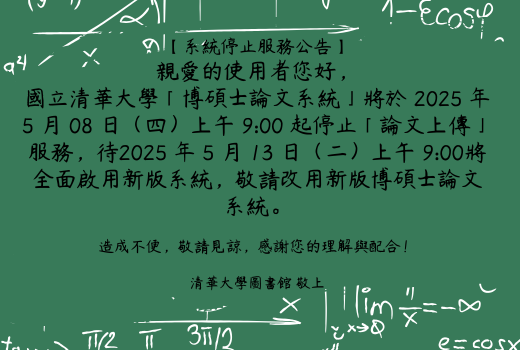|
壹、中文部分
公立高級中等以下學校教師成績考核辦法(2020年,2月20日)。
王妍蘇(2019)。普通高中校長正念領導對教師專業學習社群影響之研究。中等教育,70(4),85-99。
王沂釗(2005)。幽谷中的曙光:正向心理學發展與希望理論在輔導上的應用。教育研究,134,106-117。
王金國(2009)。正向的態度,正向的教育~正向管教的理念與作法。靜宜大學師資培育中心實習輔導通訊。8-13。
王雅玲(2018)。十二年國教中的正向管教之理論與實踐策略探討。臺灣教育評論月刊,7(10),232-237。
仲秀蓮(2011)。臺灣地區國民小學校長正向領導、學校文化對學校創新經營效能影響之研究[未出版之博士論文]。國立臺北教育大學。
江光榮(2001)。人性的迷失與賦歸:羅傑斯的人本心理學。貓頭鷹。
江志正、邢芷瑄(2015)國民中小學大型學校經營困境與解決之道[未出版之碩士論文]。國立臺中教育大學。
吳昭容(2008)。要快樂,還是要成功?從正向心理學談學習。學生輔導,106,8-17。
吳清山(2016)。教育的正向力量。高等教育。
吳清山(2017)。正念教育。教育脈動,12,13-13。
吳清山、林天祐(2008)。正向管教。教育研究,176,133。
吳清山、林天祐(2008)。教育e辭書(二版)。高等教育。
吳清山、林天祐(2009)。教育小辭書。五南。
呂佳玲(2011)。桃園縣國民中學導師正向管教與班級經營效能關係之研究[未出版的碩士論文]。輔仁大學。
呂美汎(2018)。南投市國小教師與班級經營關係之研究[未出版之碩士論文]。國立臺東大學。
呂浚瑀(2011)。國民小學校長正向領導、國際強感氛圍與組織創新能力關係之研究[未出版的碩士論文]。國立新竹教育大學。
李俊毅(2018)。公立高中職校長正向領導、教師學術樂觀與教師專業發展相關之研究[未出版之碩士論文]。國立政治大學。
李勇緻(2012)。新北市國小校長正向領導與學校效能之研究[未出版之碩士論文]。國立臺北教育大學。
李建德(2012)。臺北市國小行政人員自我管理與正向領導之研究[未出版之碩士論文]。國立臺北教育大學。
李美華(譯)(2007)。聯合國教科文組織UNESCO原著。接納、友善學習的教室:正面管教法。人本教育文教基金會。
李菁菁(2014)。高級中學校長正向領導、教師職場希望感與學校效能之相關研究[未出版之博士論文]。國立臺南大學。
沈碩彬(2008)。正向心理學在教師教學上的應用。師說,203,4-8。
車文博(2001)。人本主義心理學。東華書局。
周淑華(2009)。臺北縣國民小學教師正向管教與班級經營效能關係之研究[未出版之碩士論文]。臺北市教育大學。
林志成(2020)。教育行政行動智慧的概念建構與實踐之研究。師大書苑。
林志成、葉青青(2011)。以教師領導塑造優質學風。教育研究月刊,202,23-35。
林來利(2008)。創造雙贏!營造積極正向的管教環境。學生輔導,105,129-138。
林淑華、吳芝儀(2017)。美國學校輔導諮商發展史及對台灣學校輔導工作之啟示。輔導季刊,53(2),48-59。
林新發(2010)。校長正向領導的策略與技巧。國民教育,50(6),1-8。
林瑞鳳(2011)。澎湖縣國小教師情緒管理與正向管教之研究[未出版之碩士論文]。國立臺北教育大學。
侯亭妤(2007)。我國青少年正向情緒及相關因素之研究[未出版之碩士論文]。國立高雄師範大學。
洪郁芬、黃郁婷(2020)。臺北市國中生知覺教師正向管教與其自尊之研究。學校行政,130,38-60。
洪敏珍(2010)。國小高年級學童知覺父母正向管教、情緒智力與生活適應之研究[未出版之碩士論文]。高雄師範大學。
洪蘭(譯)(2003)。真實的快樂(原作者:Seligman, M.)。遠流。
徐嘉珍(2015)。教師如何實施正向管教,提升班級經營效能。臺灣教育評論月刊,4(3),58-62。
張文哲(譯)(2013)。教育心理學:理論與實際(原作者:Robert E. Slavin)。學富文化。
教育基本法(2013年,12月11日)。
教育部國民及學前教育署推動校園正向管教工作計畫(2014)。
教師法(2019年,06月05日)。
連廷嘉(2007)。學生管教輔導的議題與省思-正向心理學觀點。教育研究月刊,164,16-23。
陳明義(2013)。國民小學校長正向領導、組織衝突與教師組織承諾關係之研究[未出版之碩士論文]。國立新竹教育大學。
陳泊旭(2012)。國中導師正向管教與班級經營效能相關之研究[未出版之碩士論文]。國立高雄師範大學。
陳玫妏(譯)(2019)。跟阿德勒學正向教養:教師篇:打造互助合作的教室、引導學生彼此尊重、勇於負責、學習成功人生所需的技能(原作者:J. Nelsen, L. Lott, & H. S. Glenn)。大好書屋。
陳景花、余民寧(2018)。正念在臺灣學校的影響:系統性回顧及後設分析。中華輔導與諮商學報,51,67-104。
陳嘉敏(2019)。技術型高中校長正向領導之研究。學校行政雙月刊,122,67-81。
陳德中(2020)。正念領導力:以你為起點,打造高效、向心的卓越團隊。悅知文化。
傅木龍(2008)。正向管教—班級經營大未來。學生輔導,105,6-29。
彭運石(2001)。走向生命的巔峰:馬斯洛的人本心理學。貓頭鷹。
曾文志(2006)。就算短暫,也是永恆—談正向心理學的發展。師友月刊,465,57-63。
曾端真(2011)。正向管教與紀律的養成。中等教育季刊,62(1),20-31。
黃曼琳(2010)。高雄地區國小教師正向管教與學生幸福感關係之研究[未出版之碩士論文]。國立屏東教育大學。
黃詩芸(2015)。青少年版正念量表中文化研究[未出版之碩士論文]。國立臺北教育大學。
黃鳳英(2019)。從正念療癒機制論述臺灣正念教育發展。應用心理研究,70,41-76。
黃鳳英、鄧瑞瑋(2017)。兒童正念教育方案對於改善注意力與憂鬱傾向之效果。教育實踐與研究,30(2),1-34。
黃麗鴻(2012)。校長正向領導、學校組織健康、教師心理資本與組織承諾之影響關係:階層線性模式的驗證[未出版之博士論文]。國立嘉義大學。
楊諮燕(2017)。正念對青少年心理健康與數學表現之影響[未出版之博士論文]。國立臺灣師範大學。
溫宗堃(2013)。西方正念教育概觀:向融入正念訓練於我國邁進。生命教育研究,5(2),145-180。
溫宗堃(2016)。略探西方正念課程師資培訓與認證。輔仁宗教研究,32,71-101。
葉千綺(2010)。高雄縣市國小教師正向心理特質、工作壓力與生活適應關係之研究[未出版之碩士論文]。國立高雄師範大學。
葉霖(譯)(2018)。溫和且堅定的正向教養(原作者:J. Nelsen)。遠流(原著出版年:2011)。
蔡毓芬(2017)。國民小學教師正向領導對學術樂觀影響之研究:以資通訊科技運用為中介變項[未出版之碩士論文]。國立清華大學。
鄭崇趁(2005)。從學校組織再造的需求探討教訓輔三合一方案在教育改革中的角色功能。國立臺北教育大學學報,18(2),75-100。
學生輔導法(2014年11月12日)
學校訂定教師輔導與管教學生辦法注意事項(2020年06月05日)。
賴進龍(2010)。屏東縣國小教師正向管教知覺與班級經營關係之研究[未出版之碩士論文]。國立屏東教育大學。
謝明宏(2010)。新北市國中教師人際關係與正向管教之相關研究[未出版之碩士論文]。國立臺灣師範大學。
謝傳崇(2011)。校長正向領導激發學校超越表現。師友月刊,529,51-55。
謝傳崇(2012)。校長正向領導:理念、研究與實踐。高等教育。
謝傳崇(2014)。正向領導的關鍵:真誠。教育人力與專業發展,31(4),37-42。
謝傳崇(2018)。發展有意義的學校:校長正念領導之探究。教育研究月刊,292,69-86。
謝傳崇(2019)。臺灣正念教育與發展。中等教育季刊,70(4),6-18。
謝麗貞(2010)。臺北市國小教師正向管教認知與態度之研究[未出版之碩士論文]。臺北市立教育大學。
謝馨瑩(2020)。從人本主義心理學談家長教育選擇權之迷思。臺灣教育評論月刊,9(11),150-155。
鍾雲英(2018)。臺灣地區中小學校長正向領導之實踐作為。中等教育,69(3),8-26。
蘇奕娟(2018)。校長正向領導與教師情緒距離。臺灣教育評論月刊,7(1),236-242。
蘇琬珺(2007)。正向心理學對增進學生積極自我概念之啟示。國立高學師範大學教育學系教育研究報,15,121-131。
釋宗白、金樹人(2010)。止觀、無住─「禪修正念團體」對實習諮商心理師自我關注與諮商實務影響之初探研究。教育心理學報,42(1),163–184。
貳、英文部分
Abdullah, M. C.(2009). Leadership and Psy Cap: A study of the relationship between positive leadership behaviors and followers’ positive psychological capital. (Doctoral Dissertation, Capella University, 2009). ProQuest Dissertations and Theses.
Bakosh, L. S.(2013). Investigating the effects of a daily audio-guided mindfulness intervention for elementary school students and teachers. (3618722 Ph.D.), Institute of Transpersonal Psychology, Ann Arbor.
Bear, R. A.(2003). Mindfulness training as a clinical intervention: A conceptual and empirical review. Clinical psychology: Science and practice, 10,125-143.
Beck, A. R., Verticchio, H., Seeman, S., Milliken, E., & Schaab, H.(2017). A mindfulness practice for communication sciences and disorders undergraduate and speech-language pathology graduate students: Effects on stress, self-compassion, and perfectionism. American Journal of Speech-Language Pathology, 26(3), 893-907.
Bishop(2004).Mindfulness: A proposed definition. Clinical psychology: Science and practice, 11, 230-241.
Butler, J. P.(2011). Positive leadership in the military: An exploratory study. Abstract retrieved from ProQuest Dissertation and Theses database. (UMI No. 3478081)
Cameron(2008). Positive leadership: Strategies for extraordinary performance. Berrett‐Koehler.
Cameron, K. S., Dutton, J. E., & Quinn, R. E. (2003). Foundations of positive organizational scholarship., Positive organizational scholarship: Foundations of a new discipline (pp. 3-13). Berrett-Koehler Publishers.
Csikszentmihalyi, Mihaly.(1990). Flow: The Psychology of Optimal Experience.93-94.
Delizonna, L., Anstedt, T.(2015).Mindful leaders: A self-coaching guide & toolkit. North Charleston, South Carolina:Create Space Independent Publishing Platform.
Fredrickson, B. L.(2001). The role of positive emotions in positive psychology: The broaden-and-build theory of positive emotions. American Psychologist,56(3),218-226.
Gfroerer, K., Nelsen, J., & Kern, R. M. (2013). Positive discipline: Helping children develop belonging and coping resources using Individual Psychology. Journal of Individual Psychology, 69(4), 294‒304.
Gordon, J. (2008). The case for positive energy. http://www.leadervalues.com
Gutierrez, A. S., Krachman, S. B., Scherer, E., West, M. R., & Gabrieli, J. D.(2019). Mindfulness in the Classroom: Learning from a School-Based Mindfulness Intervention through the Boston Charter Research Collaborative. Transforming Education. https://transformingeducation.org/wp-content/uploads/2019/01/2019-BC RC-Mindfulness-Brief.pdf.
Ilies, R., Morgeson, F. P., & Nahrgang, J. D.(2005). Authentic leadership and eudaemonic well-being: Understanding leader-follower outcomes. The Leadership Quarterly, 16, 373-394.
Isen, A. M., Johnson, M. M. S., Mertz. E., & Robinson, G. F.(1985).The influence of positive affect on the unusualness of word associations. Journal of Personality and Social Psychology, 48, 1413-1426.
Kabat-Zinn, J.(1994). Wherever you go there you are: Mindfulness meditation in everyday life. Hyperion.
Langer, E. J.(1992). Matters of mind: Mindfulness/mindlessness in perspective. Consciousness and Cognition, 1(3), 289-305.
Lou Denti and Gil Guerin(2014).Effective Practice for Adolescents with Reading and Literacy Challenges. England:Routledge.
Luthans, F., LuIthans, K. W., Hodgetts, R. M., & Luthans, B. C.(2001). Positive approach to leadership (PAL) implications for today’s organizations. The Journal of leadership studies, 8 (2), 1-20.
Lincoln, Y. S., & Guba, E. G.(1985). Naturalistic inquiry. Beverly Hills, CA: Sage.
Nelsen, J.(2006). Positive discipline. Ballantine Books.
Norrish, J. M., Williams, P., O'Connor, M., & Robinson, J.(2013). An applied framework for positive education. International Journal of Wellbeing, 3(2), 147-161.
Norrish, J. M., & Seligman, M. E. (2015). Positive education: The geelong grammar school journey. Oxford University Press.
Seligman, M. E. P.(2002). Authentic happiness: Using the new positive psychology to realize your potential for lasting fulfilment.
Seligman, M. E. P., & Csikszentmihalyi, M. (Eds.).(2000). Positive psychology: An introduction. American Psychologist, 55, 5-14.
Shapiro, S. L., Carlson, L. E., Astin, J. A., & Freedman, B.(2006). Mechanisms of mindfulness. Journal of Clinical Psychology, 62(3), 373-386.
Snyder, C. R.(2000). Hypothesis: There is hope. In C. R. Snyder (Ed.), Handbook of hope: Theory, measures, and applications(pp. 3-21).
Volanen, S. M., Lassander, M., Hankonen, N., Santalahti, P., Hintsanen, M., Simonsen, N., Raevuori, A., Mullola, S., Vahlberg, T., But, A., & Suominen, S.(2020). Healthy learning mind-effectiveness of a mindfulness program on mental health compared to a relaxation program and teaching as usual in schools: A cluster-randomized controlled trial. Journal of Affective Disorders, 260, 660-669. https://doi.org/10.1016/j.jad.2019.08.087
Wilson, Jeff.(2014). Mindful America: The mutual transformation of buddhist meditation and American culture. Oxford University Press.
|
